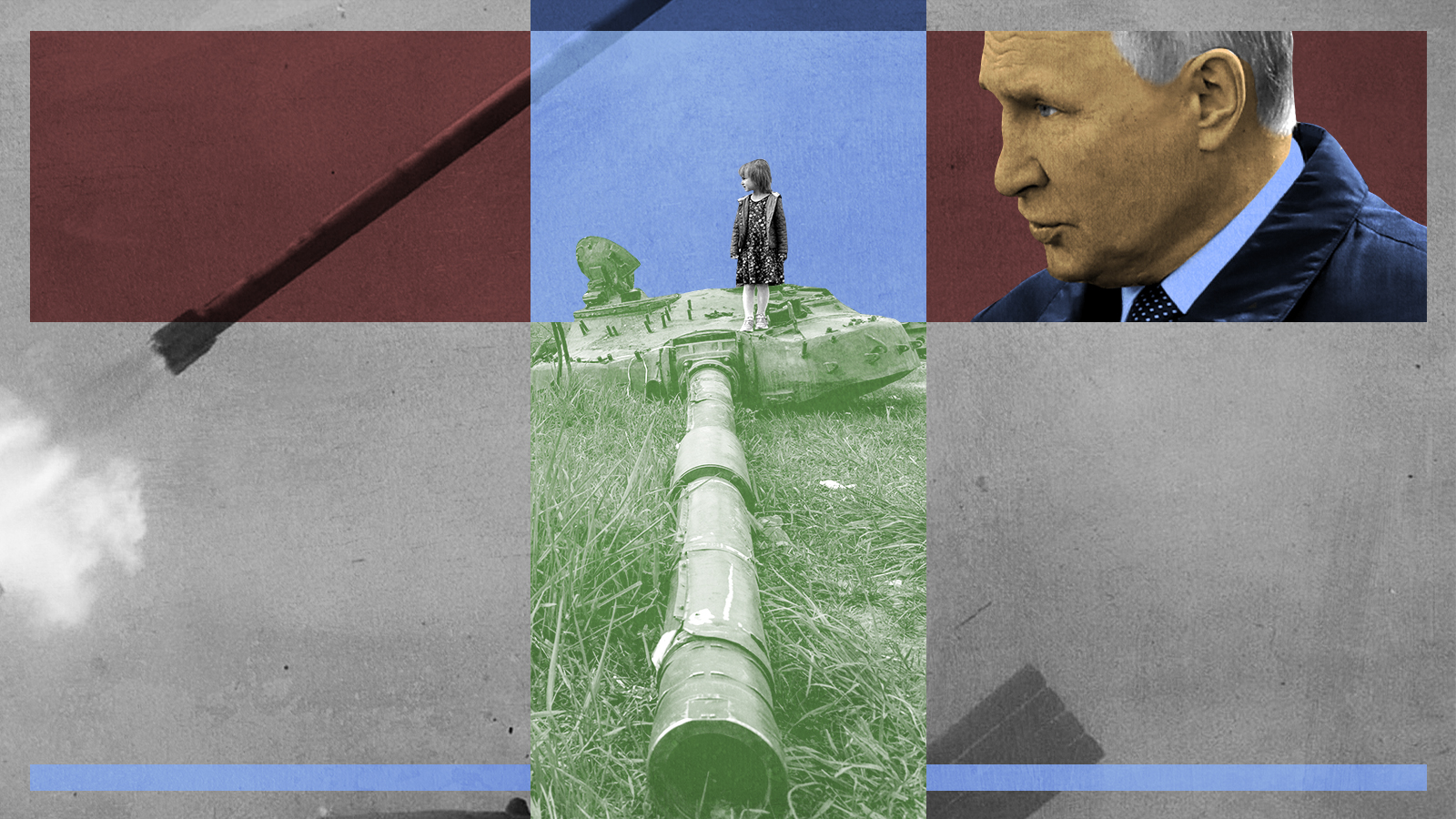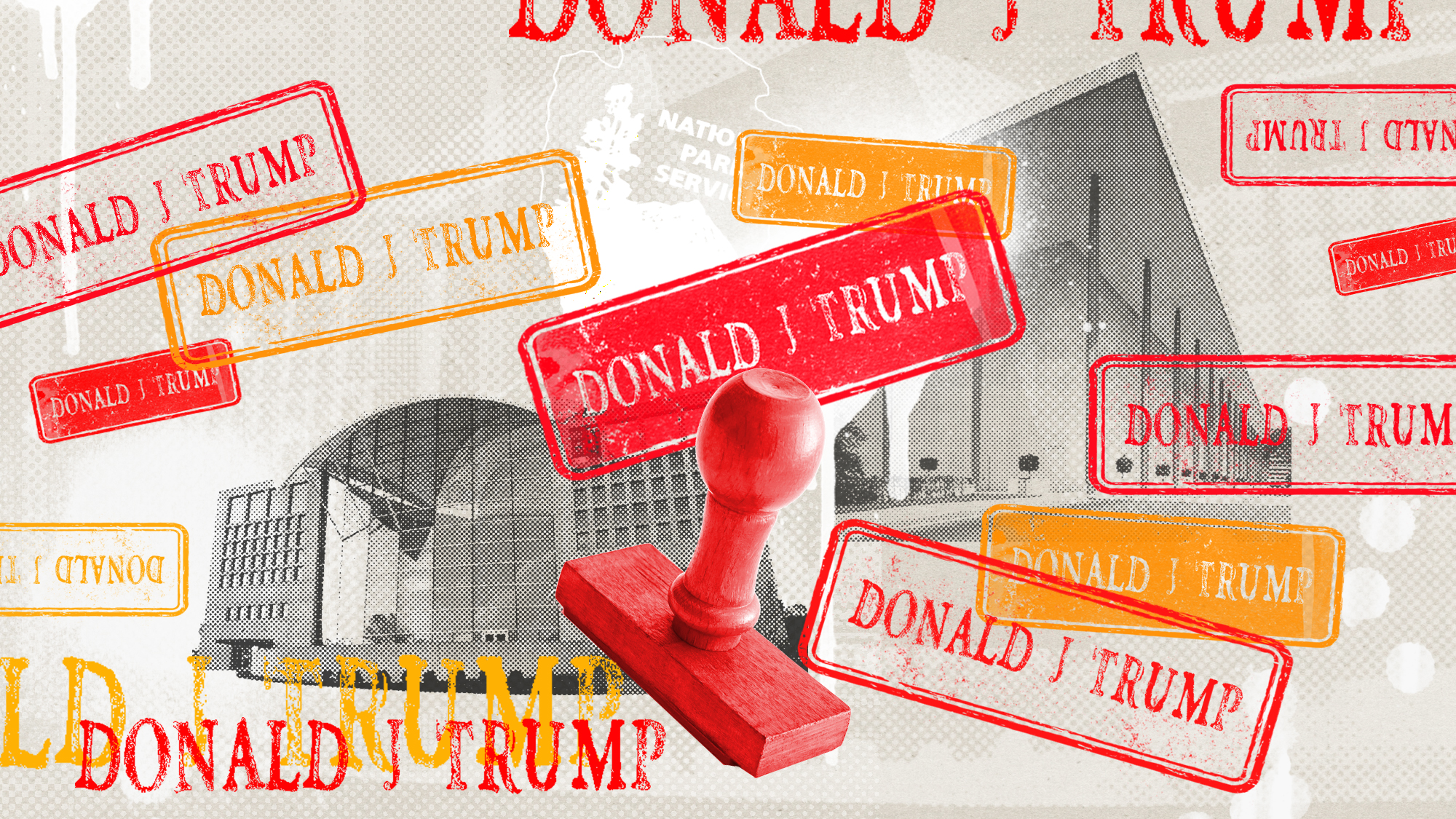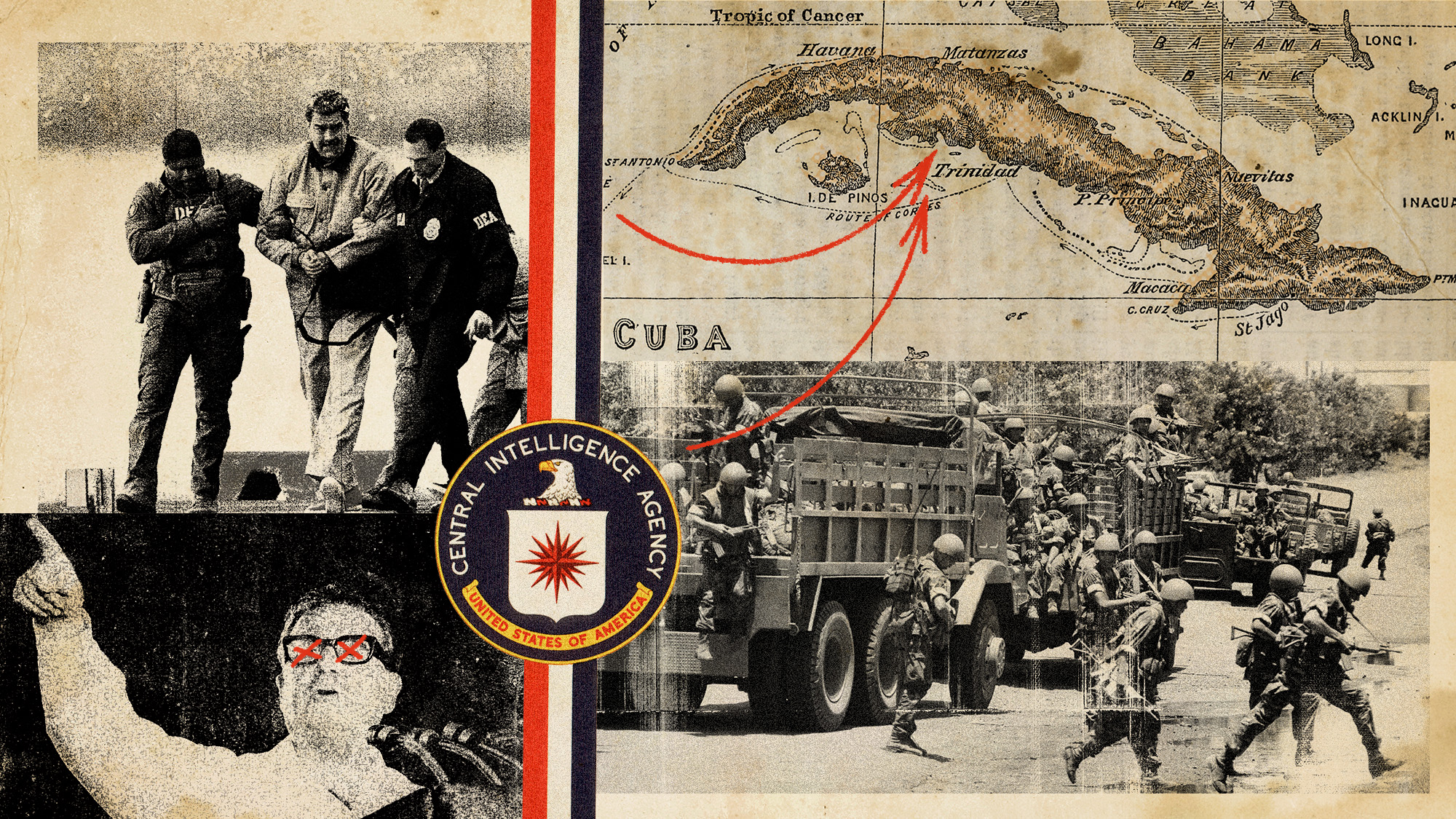How strong is Russia's army?
A glance behind Moscow's military failures


A free daily email with the biggest news stories of the day – and the best features from TheWeek.com
You are now subscribed
Your newsletter sign-up was successful
Russia's mighty army was supposed to roll into Ukraine, take its capital, Kyiv, in 48 to 72 hours and conquer the entirety of its much smaller neighbor in 10 days, according to the British think tank RUSI. Three years and tens of thousands of dead soldiers later, Russia is mired in a grueling war of attrition, using its expendable numerical superiority to grind out small gains in eastern Ukraine and try to wrest back a sizable toehold that Ukraine managed to gain inside Russia when Moscow was caught unawares.
Russia is now dependent on missiles and drones from Iran, economic munificence from China and rockets and artillery shells from North Korea, one of the poorest nations on Earth. Pyongyang has even sent more than 10,000 North Korean soldiers to help boost Vladimir Putin's flagging invasion.
Wars are unpredictable, but Ukraine is humiliating the Kremlin — killing its generals, sinking its battleships, destroying or capturing its tanks, pushing back Russian advances, taking new territory. The price has been enormous — more than a million people dead or wounded so far, The Wall Street Journal said in September, including an estimated 200,000 Russian soldiers killed in action. Ukrainian cities, villages and infrastructure have been battered by Russian missiles and bombs. And the war has cost many billions of dollars, not counting the inevitable reconstruction.
The Week
Escape your echo chamber. Get the facts behind the news, plus analysis from multiple perspectives.

Sign up for The Week's Free Newsletters
From our morning news briefing to a weekly Good News Newsletter, get the best of The Week delivered directly to your inbox.
From our morning news briefing to a weekly Good News Newsletter, get the best of The Week delivered directly to your inbox.
This was not "shock and awe," or a biltzkreig, or even the fight you would expect from one of the biggest and most powerful armies in the world. What's going on with Russia's vaunted military?
Russia had unrealistic expectations
"The reality," U.S. Director of National Intelligence Avril Haines said to the Senate in May 2022, is that "Putin faces a mismatch between his ambitions and Russia's current conventional military capabilities."
Russia's original war aim "was to inflict a decisive blow on Ukraine that would transform the country's political institutions," Zack Beauchamp said at Vox. Putin's early retreat from Kyiv and the rest of northern Ukraine "de facto conceded that its fundamental war aim was outside of its power." His losses since then confirmed it.
Russia's war in Ukraine "is already a strategic failure," said Olga Oliker at the International Crisis Group, per Vox. "What they wanted out of this was a compliant Ukraine run by people friendly to Russia. This does not seem like a plausible outcome — and, aside from that, their forces have proven to be much less capable than almost everyone thought." Putin has "already lost Ukraine," President Biden assessed in February 2023. He assumed Russian forces would "get a welcome by every Russian speaker" in Ukraine and "that NATO would collapse" and "be afraid to act," but "go down the line, none of that's happening."
A free daily email with the biggest news stories of the day – and the best features from TheWeek.com
Ukraine exploited Russian missteps
When Russia launched its invasion, it tried to quickly seize Kyiv and other major population centers, assuming there would be "light Ukrainian resistance, which did not end up being the case," said Beauchamp. Russian forces were also "undercut by poor logistics and a decision to travel on open roads that created easy opportunities for ambushes. The Ukrainians took advantage, raiding Russia's weak supply lines and stymieing the Russians in brutal block-to-block fighting" and savage drone attacks on Russian armor.
Early footage and news reports showed "Russia's armored vehicles abandoned for lack of fuel, its soldiers foraging for food, its transport planes shot out of the sky, its various military elements — tanks, infantry, aircraft — unable to coordinate their aims," Fred Kaplan said at Slate. Putin wanted a blitzkrieg, "but the Russian army isn't cut out for lightning strikes."
"If we've learned anything in this conflict so far, it's that theoretical Russian advantages don't always translate to battlefield success," Beauchamp said. As the spring turned to summer, for example, Ukraine's military tricked Russia into preparing to defend a Ukrainian counteroffensive on southern Kherson, then overran lightly guarded Russian positions in northeastern Kharkiv and parts of the Donbas, recapturing a wide stretch of territory. Ukraine then used new, Western-supplied precision missiles to cut off Russian supply lines in Kherson and push Moscow's army out of the regional capital.
Russia failed on the electronic battlefield
"Among Russia's most costly mistakes when it invaded Ukraine was the expectation that it would dominate the electronic warfare part of the battle," David Ignatius said at The Washington Post. When it came to jamming or intercepting communications, "the Russians overestimated their own capabilities, underestimated Ukraine's — and didn't reckon on the power of NATO military support for Kyiv."
Russia's electronic warfare ops were "dazzling" when it invaded Ukraine in 2014, but Ukraine sharply improved its capabilities since then and "Russia's centralized, top-down command structure" meant nobody was empowered to "make speedy fixes," Ignatius said. So "when their fancy communications equipment broke down, the Russians resorted to cellphones on Ukrainian networks, which revealed not just their plans but their locations — allowing precise attacks," including one that killed Maj. Gen. Andrei Simonov, "among his country's leading electronic war specialists."
Initially, Russia's ill-prepared and overstretched military "did not have time to coordinate its electronic warfare systems," so "when Russian forces attempted to jam Ukraine's communications, they also jammed their own," Dara Massicot said at Foreign Affairs. But "the Russian military has learned from its mistakes and made big adjustments, such as downsizing its objectives and mobilizing new personnel, as well as tactical ones, such as using electronic warfare tools that jam Ukrainian military communications without affecting its own."
Sanctions are taking their toll
The U.S. and its allies have hit Russia with all kinds of punitive sanctions, many of them aimed at preventing Russia from rebuilding its arsenal. And it's working, Commerce Secretary Gina Raimondo testified before Congress. "We have reports from Ukrainians that when they find Russian military equipment on the ground, it's filled with semiconductors that they took out of dishwashers and refrigerators," Raimondo said.
"We're going to see additional impacts on the battlefield as the Russian aerospace industry and the Russian maritime industry is unable to source its parts, which they need in order to keep their planes flying, their submarines moving and their boats sailing," Raimondo deputy Matthew Axelrod said to The Wall Street Journal's Risk & Compliance Forum.
Russia's army just isn't very good
Russia's failures are due in part to "the valiant resistance of Ukraine's army and civilian defense forces," Kaplan said. "But it's also due to the fact that the Russian army just isn't very good." Seriously, "I've watched the Russian army for years. I knew they weren't good, but I never suspected they'd were this bad," retired U.S. Lt. Gen. Mark Hertling said on X. "Corruption has taken over their ranks, their government, their leadership on a scale that is mafia-like."
In fact, Putin valorizes Russia's defeat of the Nazis in World War II "because Russia's history offers few comparable military achievements," said Sir Lawrence Freedman, the dean of British war studies scholars, on Substack. The 20th century began with Russia's "humiliating defeat at the hands of Japan" and ended with Russia "humiliated by the secessionist Chechnya in one war" before winning the second only "by adopting brutal tactics."
Russia's bloody and costly victory in 1945 "left an abiding image of a military steamroller, a mass army crushing all before it through its sheer weight," but "it is now apparent that there is no steamroller," Freedman said. Russia started dismantling the steamroller in the 1990s, unable to "manage or justify such a large military" after the Cold War ended, Massicot said. The smaller, more nimble, and purportedly more professionalized Russian armed forces "are not wholly incompetent or incapable of learning," and Moscow "could continue to adjust its strategy and solidify its occupied holdings in the south and east, eventually snatching a diminished variant of victory from the jaws of defeat."
Still, the sad irony is that both Adolf Hitler and Napoleon Bonaparte made the same kind of ruinous strategic miscalculations about Russia that Putin made with Ukraine, Joe Donato said at Modern War Institute. "Vladimir Putin is not Hitler or Napoleon, but there are striking similarities between the flawed theory of victory that undergirded his foray into Ukraine and their doomed invasions of Russia."
Peter has worked as a news and culture writer and editor at The Week since the site's launch in 2008. He covers politics, world affairs, religion and cultural currents. His journalism career began as a copy editor at a financial newswire and has included editorial positions at The New York Times Magazine, Facts on File, and Oregon State University.
-
 How the FCC’s ‘equal time’ rule works
How the FCC’s ‘equal time’ rule worksIn the Spotlight The law is at the heart of the Colbert-CBS conflict
-
 What is the endgame in the DHS shutdown?
What is the endgame in the DHS shutdown?Today’s Big Question Democrats want to rein in ICE’s immigration crackdown
-
 ‘Poor time management isn’t just an inconvenience’
‘Poor time management isn’t just an inconvenience’Instant Opinion Opinion, comment and editorials of the day
-
 Witkoff and Kushner tackle Ukraine, Iran in Geneva
Witkoff and Kushner tackle Ukraine, Iran in GenevaSpeed Read Steve Witkoff and Jared Kushner held negotiations aimed at securing a nuclear deal with Iran and an end to Russia’s war in Ukraine
-
 ‘The forces he united still shape the Democratic Party’
‘The forces he united still shape the Democratic Party’Instant Opinion Opinion, comment and editorials of the day
-
 ‘The mark’s significance is psychological, if that’
‘The mark’s significance is psychological, if that’Instant Opinion Opinion, comment and editorials of the day
-
 A running list of everything Donald Trump’s administration, including the president, has said about his health
A running list of everything Donald Trump’s administration, including the president, has said about his healthIn Depth Some in the White House have claimed Trump has near-superhuman abilities
-
 Trump’s ‘Board of Peace’ comes into confounding focus
Trump’s ‘Board of Peace’ comes into confounding focusIn the Spotlight What began as a plan to redevelop the Gaza Strip is quickly emerging as a new lever of global power for a president intent on upending the standing world order
-
 A running list of everything Trump has named or renamed after himself
A running list of everything Trump has named or renamed after himselfIn Depth The Kennedy Center is the latest thing to be slapped with Trump’s name
-
 A running list of the international figures Donald Trump has pardoned
A running list of the international figures Donald Trump has pardonedin depth The president has grown bolder in flexing executive clemency powers beyond national borders
-
 A running list of US interventions in Latin America and the Caribbean after World War II
A running list of US interventions in Latin America and the Caribbean after World War IIin depth Nicolás Maduro isn’t the first regional leader to be toppled directly or indirectly by the US
